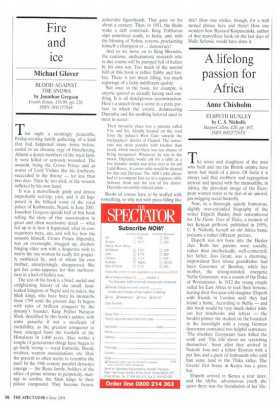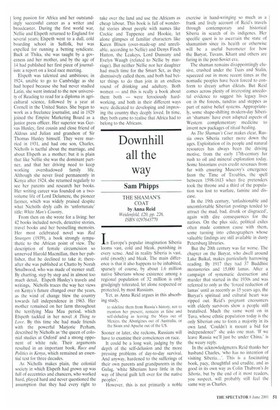A lifelong passion for Africa
Anne Chisholm
ELSPETH HUXLEY by C. S. Nicholls
HarperCollins, £20, pp .497, ISBN 000257165X
The wives and daughters of the men who built and ran the British empire have never had much of a press. Of India it is always said that snobbery and segregation arrived and spread with the memsahibs; in Africa, the prevalent image of the European woman tends to be that of an amoral, gin-swigging social butterfly.
Now, in a thorough, quietly humorous, slightly over-extended biography of the writer Elspeth Huxley (best remembered for The Flame Trees of Thilca, a memoir of her Kenyan girlhood, published in 1959), C. S. Nicholls, herself an old Africa hand, presents a rather different picture.
Elspeth was not born into the Huxley clan. Both her parents were socially, rather than intellectually, well-connected; her father, Joss Grant, was a charming, improvident Scot whose grandfather had been Governor of Bombay, while her mother, the strong-minded, energetic Nellie Grosvenor, was a cousin of the Duke of Westminster. In 1912 the young couple sailed for East Africa to seek their fortune, leaving their five-year-old daughter Elspeth with friends in London until they had found a home. According to Nellie — and this book would be very much duller without her notebooks and letters — the Swahili primer she studied on the boatdeck in the moonlight with a young German lieutenant contained two helpful sentences: The drunken Europeans have killed the cook' and 'The idle slaves are scratching themselves'. Soon after they arrived in Nairobi Joss met a fellow Etonian with a pet lion and a pack of foxhounds who sold him some land in the Thika valley. The Grants' first house in Kenya was a grass hut.
Elspeth arrived in Kenya a year later, and the idyllic, adventurous youth she spent there was the foundation of her life long passion for Africa and her outstandingly successful career as a writer and broadcaster. During the first world war, Nellie and Elspeth returned to England for several years; Elspeth went to a dull, cold boarding school in Suffolk, but was expelled for running a betting syndicate. Back at Thika, she was taught by a governess and her mother, and by the age of 14 had published her first piece of journalism: a report on a local race meeting.
Elspeth was talented and ambitious; in 1924, unable to go to Cambridge as she had hoped because she had never studied Latin, she went instead to the new university of Reading to read for a diploma in agricultural science, followed by a year at Cornell in the United States. She began to work as a freelance journalist, and in 1929 joined the Empire Marketing Board as a junior press officer. Her superior was Gervas Huxley, first cousin and close friend of Aldous and Julian and grandson of Sir Thomas Huxley himself. They were married in 1931, and had one son, Charles. Nicholls is tactful about the marriage, and about Elspeth as a mother; but it is plain that like Nellie she was the dominant partner, and that her driving need to keep working overshadowed family life. Although she never lived permanently in Kenya after 1924, she returned regularly to see her parents and research her books. Her writing career was founded on a twovolume life of Lord Delamere, the pioneer farmer, which was widely praised despite what Nicholls dryly calls its 'unfortunate' title: White Man's Country.
From then on she wrote for a living; her 42 books included novels, detective stories, travel books and her bestselling memoirs. Her most celebrated novel was Red Strangers (1939), a book strongly sympathetic to the African point of view. The description of female circumcision so unnerved Harold Macmillan, then her publisher, that he declined to take it; thereafter she was published at Chatto by Norah Smallwood, who was made of sterner stuff. By charting, step by step and in almost too much detail, Elspeth Huxley's travels and writings, Nicholls traces the way her views on Kenya's future changed over the years, as the wind of change blew the country towards full independence in 1963. Her mother remained on her farm throughout the terrifying Mau Mau period, which Elspeth tackled in her novel A Thing to Love. By this time she had made friends with the powerful Marjorie Perham, described by Nicholls as 'the queen of colonial studies at Oxford' and a strong opponent of white rule. Their arguments resulted in an important book, Race and Politics in Kenya, which remained an essential text for three decades.
As Nicholls makes plain, the colonial society in which Elspeth had grown up was full of eccentrics and chancers, who worked hard, played hard and never questioned the assumption that they had every right to take over the land and use the Africans as cheap labour. This book is full of wonderful stories about people with names like Cockie and Tuppence and Hookie, let alone glimpses of familiar characters like Karen Blixen (over-made-up and unreliable, according to Nellie) and Denys Finch Hatton, the Leakeys, Lord Dunsany and Evelyn Waugh (related to Nellie by marriage). But neither Nellie nor her daughter had much time for the Smart Set, as they dismissively called them, and both had better things to do than join in an endless round of drinking and adultery. Both women — and this is really a book about them both — were ferociously hardworking, and both in their different ways were dedicated to developing and improving the country they deeply loved. In time, they both came to realise that Africa had to belong to the Africans.























































































 Previous page
Previous page